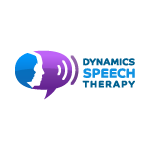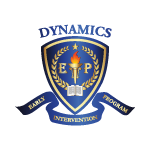|
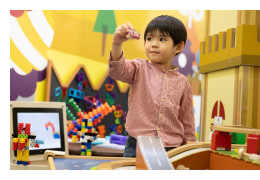 Early language development is crucial for a child's overall growth and success, laying the foundation for effective communication, social skills, and academic achievement. One of the most effective ways to nurture these skills is through play. Playtime, with its engaging and interactive nature, stimulates a child's brain, encourages vocalizations, and fosters an understanding of language in context. Early language development is crucial for a child's overall growth and success, laying the foundation for effective communication, social skills, and academic achievement. One of the most effective ways to nurture these skills is through play. Playtime, with its engaging and interactive nature, stimulates a child's brain, encourages vocalizations, and fosters an understanding of language in context.
Whether through storytelling, role-playing, or interactive games, children learn new words, sentence structures, and conversational skills. Thus, playtime becomes more than just fun; it's a vital and powerful tool for developing language abilities, setting the stage for a lifetime of learning and growth.
|
| Events & Promotions |
 |
| Receive a complimentary 20 Minute video call or phone consultation! |
| Confused if your child needs therapy? Speak to our highly qualified therapists to find a solution... |
|
|
|
| Dynamics Social Skills Groups |
| Unlock your child's potential with Dynamics' Social Skills classes in Singapore! |
|
|
|
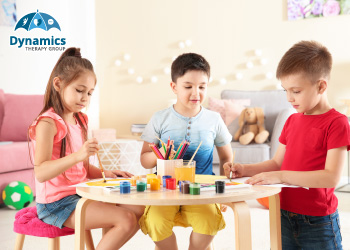 |
|
| Tips |
|
Here are some tips to make the most of playtime for language development:

- 1. Interactive Play
Engage in play activities that enable back-and-forth interactions. Games like "peek-a-boo", "pat-a-cake", and simple turn-taking games increase opportunities for social interaction and in listening and responding to others. Pretend play that includes role-playing, the use of imagination, and multiple sequences in play actions such as playing with the doll house, grocery store, or doctor will help your child develop their vocabulary and practice using different sentences.

- 2. Reduce Questions, Model More!
While playing, join in and sit face-to-face with your child while you talk about the activity or what you or your child is doing. Provide language models by using appropriate phrases and sentences with different descriptive words to help your child learn the new words in context. For example, "The teddy bear is sleeping."; "Oh, that's a tall tower!"; "Whee! The blue car is going down!"

- 3. Reading Together
Reading is a fantastic way to build language skills. Choose books with colorful pictures and simple stories. Talk about the pictures as you tell the stories and how the characters might be feeling, or make predictions about the story (e.g., asking "What do you think will happen next?"). This allows your child to develop his/her vocabulary and story comprehension. Avoid asking too many questions and focus on commenting on the pictures instead.

- 4. Sing Songs and Rhymes
Songs and nursery rhymes are not only entertaining but also educational. They help young children to learn language and rhymes which can improve their overall phonological awareness and memory for words and phrases. If your child has difficulties remembering the whole song, include gestures and help them to fill in the blanks instead. For example, pause before singing the last word of the sentence /song such as, "Twinkle, twinkle, little..." and your child can respond with "star". Always allow time for your child to respond before jumping in too early to help them.

- 5. Follow Your Child's Lead
Pay attention to what interests your child and join in. If they're fascinated by animals, play with animal toys and talk about their sounds, movements, and habitats. Following their interests keeps them engaged and eager to learn.
In addition to fostering language development through play, it's essential to be aware of early signs of speech and language delay in preschoolers. Look out for these signs:

- Limited vocabulary compared to peers.
- Difficulty forming sentences or using age-appropriate grammar.
- Challenges in understanding simple instructions.
- Frequent mispronunciations that are unusual for their age or have limited intelligibility in conversations.
- Lack of interest or difficulties in social interactions and playing with other children.
- Difficulties in responding to basic social communication, such as asking for help or expressing needs.
If you notice any of these signs, consider consulting a speech-language therapist for a comprehensive evaluation. Early intervention can make a significant difference.
We hope that you will experience a fun and interactive playtime with your child! By incorporating these tips into your daily routine, you can create a language-rich environment that supports your child's early development.
|
|
| Employee Spotlight |
 |
Lestari Maspolim
Speech Therapist |
Meet Lestari, our Speech Therapist at Dynamics Therapy Group. Get to know her better as she answers ten fun questions in this month's Employee Spotlight!
Click here, to get up close and personal with Lestari! |
|
|
| Success Story |
 |
Flinn's Communication Triumph: A Success Story
|
|
Meet Flinn, a spirited 4-year-old facing the challenges of speech and language development. His journey is marked by the struggle to express himself, leading to moments...
Click here
|
|
|
|

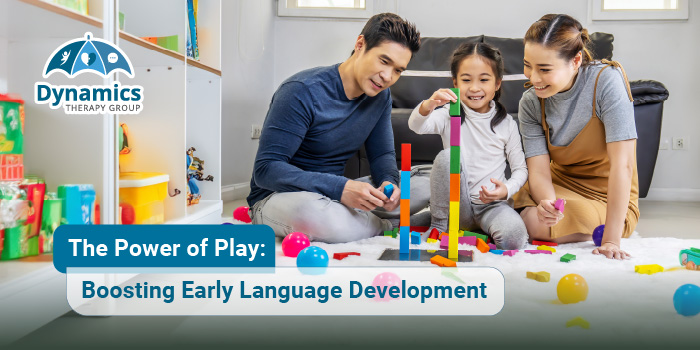
 Early language development is crucial for a child's overall growth and success, laying the foundation for effective communication, social skills, and academic achievement. One of the most effective ways to nurture these skills is through play. Playtime, with its engaging and interactive nature, stimulates a child's brain, encourages vocalizations, and fosters an understanding of language in context.
Early language development is crucial for a child's overall growth and success, laying the foundation for effective communication, social skills, and academic achievement. One of the most effective ways to nurture these skills is through play. Playtime, with its engaging and interactive nature, stimulates a child's brain, encourages vocalizations, and fosters an understanding of language in context.










